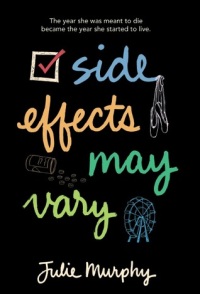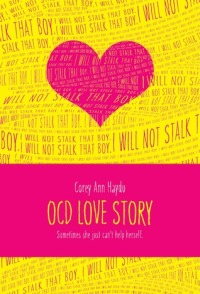
Some readers find Alice in SIDE EFFECTS MAY VARY unlikable…but I think this is an important book BECAUSE Julie Murphy depicts Alice’s anger in such a raw, honest way.
If you’ve ever read reviews on Goodreads or Amazon, you know that readers find characters unlikable ALL THE TIME. The fact that some readers find a character unlikable doesn’t mean that a writer has done anything wrong. Certain characters simply elicit strong positive and negative reactions.
One of the most powerful things about reading is that readers can empathize with characters even when characters do unkind or unwise things. Readers can recognize themselves—even the parts of themselves that they’re not proud of—in characters, and that can be a huge relief.
While every reader does not need to like every main character in every moment, most writers probably don’t aim to create alienating characters. I’ve been thinking about character likability lately because I’ve been working on a book with a narrator who is a bit…prickly, at times. I was lucky to have a couple of very insightful writer friends read my manuscript earlier this summer, and they pointed out a few places where my character was off-putting in ways I hadn’t intended. That feedback was extremely valuable as I revised.
Based on my friends’ feedback on my story and the reviews I’ve read for other people’s stories, I think there are a variety of reasons why readers might struggle to like a character. Those reasons include:
1.) Whininess. If a character whines too much and feels sorry for him or herself, that’s often a turnoff.
2.) Lack of obstacles/antagonists. This one is related to whininess. If a character is having a hard time or complaining a lot but things seem to be going pretty well, readers may get impatient.
3.) Lack of growth. If the character doesn’t seem to be growing or changing at all throughout the story, that can also be frustrating.
4.) Cruelty to likable characters. If the protagonist thinks mean things about or does mean things to kind, generous secondary characters, then readers might begin to dislike the protagonist. (Unless the reader understands why the character is pushing others away and the character is likable in other ways.)
5.) Extreme Cluelessness. It can be compelling to read about a character who doesn’t yet realize something that the reader knows to be true. But if there are too many blatantly clear signs of something (such as another character’s affection), the reader is likely to get annoyed at the character’s cluelessness. (Again, unless the reader understands why the character cannot recognize something that seems obvious.)

Corey Ann Haydu doesn’t shy away from letting her characters do unsettling things, and I think her books are important for that reason (but can be tough to read at times).
6.) Extremely risky decisions. Some readers might also shut down when they read about a character who puts herself in physically or psychologically unsafe situations. That doesn’t mean that characters shouldn’t do ill-advised things, but I think it’s useful to know that some readers might put a book down when a character is doing a whole lot of dangerous, cringe-worthy things. (Although, again, if readers understand why the character is making those decisions, that will help.)
Now, this is all pretty subjective. One reader might have an especially low tolerance for whininess, and another reader might balk at too many dangerous situations. Writers can’t control everybody’s reactions. But when it’s time to revise, I find it helpful to look out for these six potential issues.
As I was working on my new manuscript, I found that it’s also a good idea to balance potentially off-putting moments with positive ones. I tried to create relationships and situations in which my character could be her kindest self. Often, in the moments that my writing friends flagged, too many pages had elapsed since I’d included a positive scene, so I needed to find a way to add one. (Last year, I mentioned how Lyn Miller-Lachmann effectively weaves in positive moments in Rogue in another post on character likability.)
I also found that I needed to incorporate moments when readers can clearly see my character’s vulnerability. Readers need to see what she yearns for and fears even if she doesn’t want to acknowledge those things. Because, as I suggested throughout my list of potential likability issues, if readers see deeply into our characters and understand the reasons for the characters’ thoughts and actions, they are likely to hang in there and love our characters even in moments when they don’t especially like them.
What do you think? Have you noticed any other likability issues? Have you read other books with characters who are occasionally unlikable but still lovable overall?

Laurie, I really enjoyed this post. Sometimes my dislike of a character keeps me from finishing a book. Other times it’s not so much of a hindrance. I can’t help thinking of the classic book Vanity Fair. Becky Sharp was meant to be a character we dislike. The movie adaptation unfortunately blunted her edges and made her less effective (IMHO). I also think of Before I Fall by Lin Oliver. I thought she did a great job at making an unlikable character vulnerable. I disliked Sam at first, but grew to love her.
I’m glad your betas gave you good insight. Reader needs to see what’s good about prickly characters so we can empathize. But as you said, authors can’t control the reactions of readers. Some complain about extremely likable characters for unexplained reasons!
Thanks for reading and for your insights!! I remember having a similar reaction to Sam in BEFORE I FALL.
In some cases I am with you 100% in that at times if I don’t like a character I am less interested in reading their stories. In other cases I have read characters who were not particularly likable but were so interesting that I was willing to overlook their flaws. That being said whiney characters ruin books for me, but that’s more that whining has always been a pet peeve of mine. LOL!!! Great post!!!
Thanks for reading! I love that experience, of reading about a character who is not objectively likable but who is so fascinating that it doesn’t matter. And whininess is a turnoff for me, too.
So smart of you to come up with the link between unlikeability and lack of antagonists. It really is very, very hard to like someone who whines without reason. Thanks so much for this!
Thanks, Sandra! I have to give a couple of our fellow Secret Gardeners most of the credit for that insight–in my drafts, I tend to create some good antagonism at the beginning of a book and then let it slide in the second half. They’ve helped me to realize that my characters are harder to root for when I let that happen.